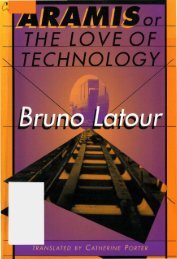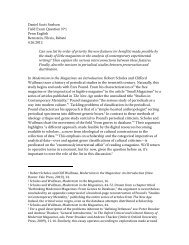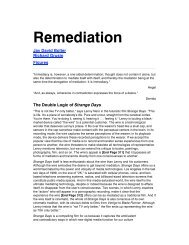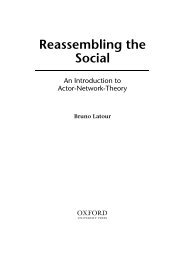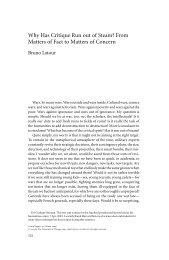The Exploit: A Theory of Networks - asounder
The Exploit: A Theory of Networks - asounder
The Exploit: A Theory of Networks - asounder
You also want an ePaper? Increase the reach of your titles
YUMPU automatically turns print PDFs into web optimized ePapers that Google loves.
134 Edges<br />
things have been otherwise? What is it—can one ever claim with<br />
certainty—that hasn’t happened, and how could it ever be achieved?<br />
“Reports that say that something hasn’t happened are always interesting<br />
to me,” Secretary <strong>of</strong> Defense Donald Rumsfeld said on the<br />
morning <strong>of</strong> February 12, 2002, responding to questions from the press<br />
about the lack <strong>of</strong> evidence connecting Iraqi weapons <strong>of</strong> mass destruction<br />
with terrorists. “Because as we know, there are known knowns;<br />
there are things we know we know. We also know there are known un -<br />
knowns; that is to say we know there are some things we do not know.<br />
But there are also unknown unknowns—the ones we don’t know we<br />
don’t know.” <strong>The</strong>re is the unknown soldier. But this is a known unknown,<br />
a statistical process <strong>of</strong> elimination. It is the unknown unknown<br />
that is the most interesting. It is a characteristic <strong>of</strong> present knowledge<br />
that it cannot simply be negated to be gotten rid <strong>of</strong>; knowledge must be<br />
negated twice. But the tragedy <strong>of</strong> the contemporary moment is that<br />
this double negation is not, as it were, nonaligned; it is already under -<br />
stood as a deficiency in one’s ability to imagine not utopia but dystopia:<br />
the inability to imagine that terrorists would use planes as missiles, just<br />
as it was the inability to imagine the kamikaze pilot at Pearl Harbor.<br />
<strong>The</strong>se are Rumsfeld’s unknown unknowns. <strong>The</strong> imagination <strong>of</strong> the<br />
future, the vision <strong>of</strong> the new, is a vision <strong>of</strong> death, fear, and terror. So<br />
not only is the unknown unknown a threat as such, and therefore<br />
dif fi cult to bring into imagination as utopia or any another mode <strong>of</strong><br />
thought, but the very process <strong>of</strong> attempting to imagine the unknown<br />
unknown drags into the light its opposite, the end <strong>of</strong> humanity.<br />
Codification, Not Reification<br />
An important future political problem will no longer be the alienation<br />
<strong>of</strong> real social relations into objects, but the extraction <strong>of</strong> abstract<br />
code from objects. In other words, codification not reification, is the<br />
new concern. <strong>The</strong> code in question can be either machinic or genetic;<br />
that is to say, it can be both the codification <strong>of</strong> motor phenomena or<br />
the codification <strong>of</strong> essential patterns. <strong>The</strong> vulgar Marxist approach<br />
decries the loss <strong>of</strong> authentic, qualitative social relations. But in fact<br />
the transformation under capitalism is at the same time the movement<br />
into the fetish <strong>of</strong> the qualitative—“Quantity has been trans-



